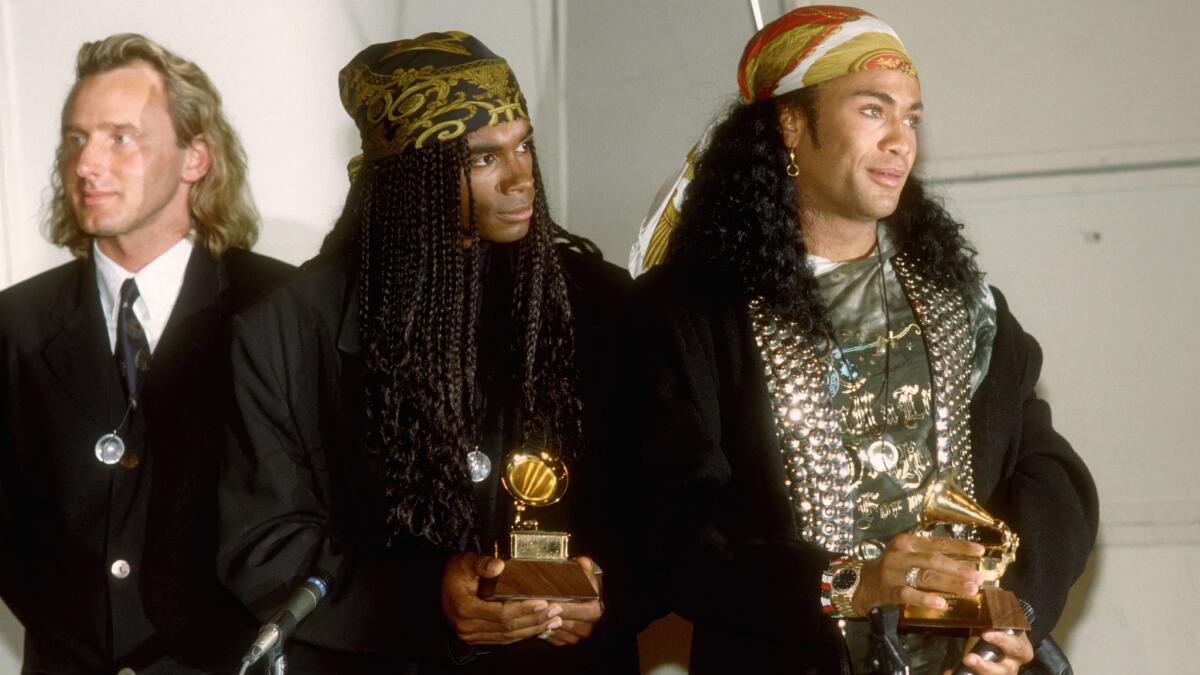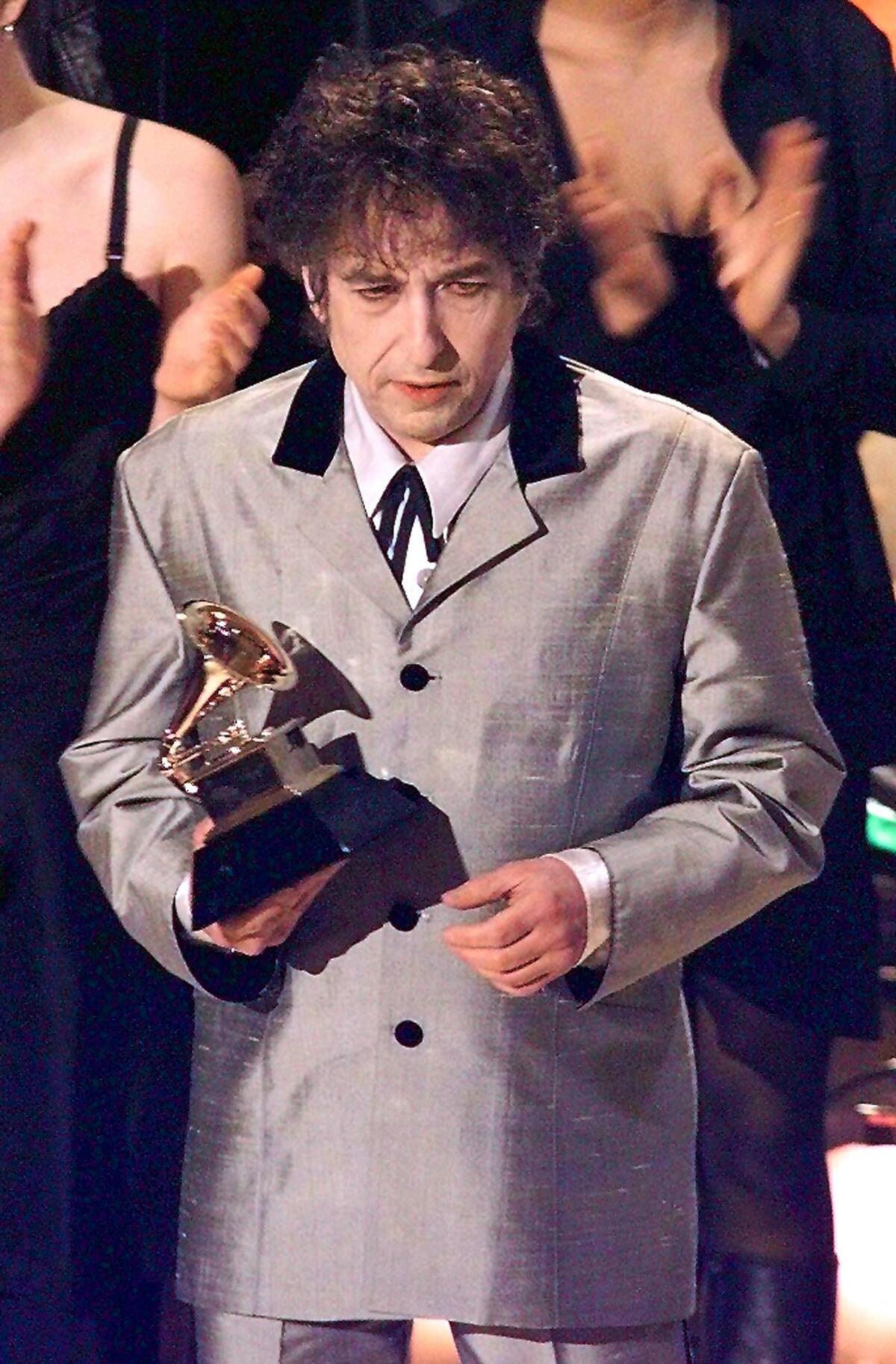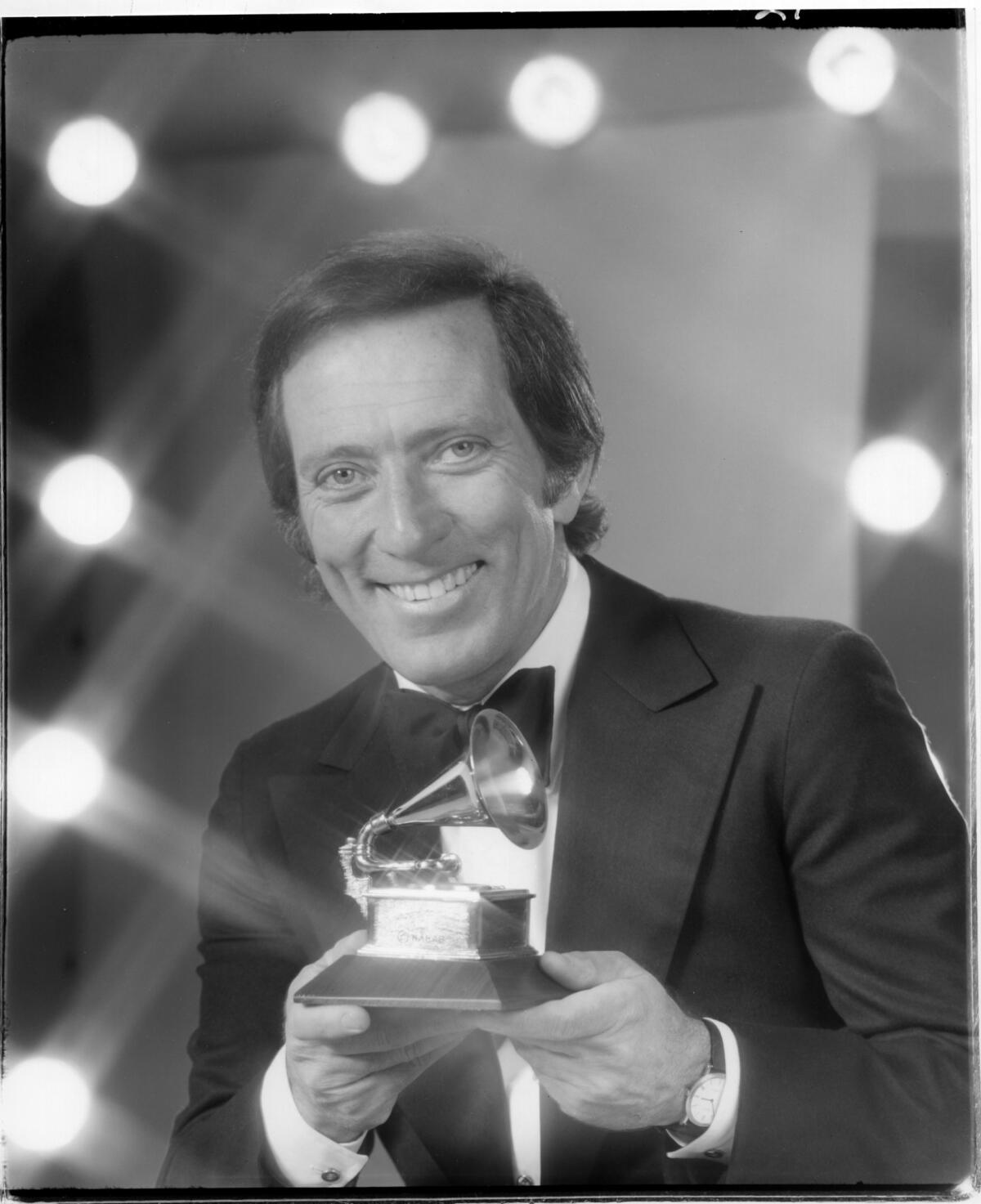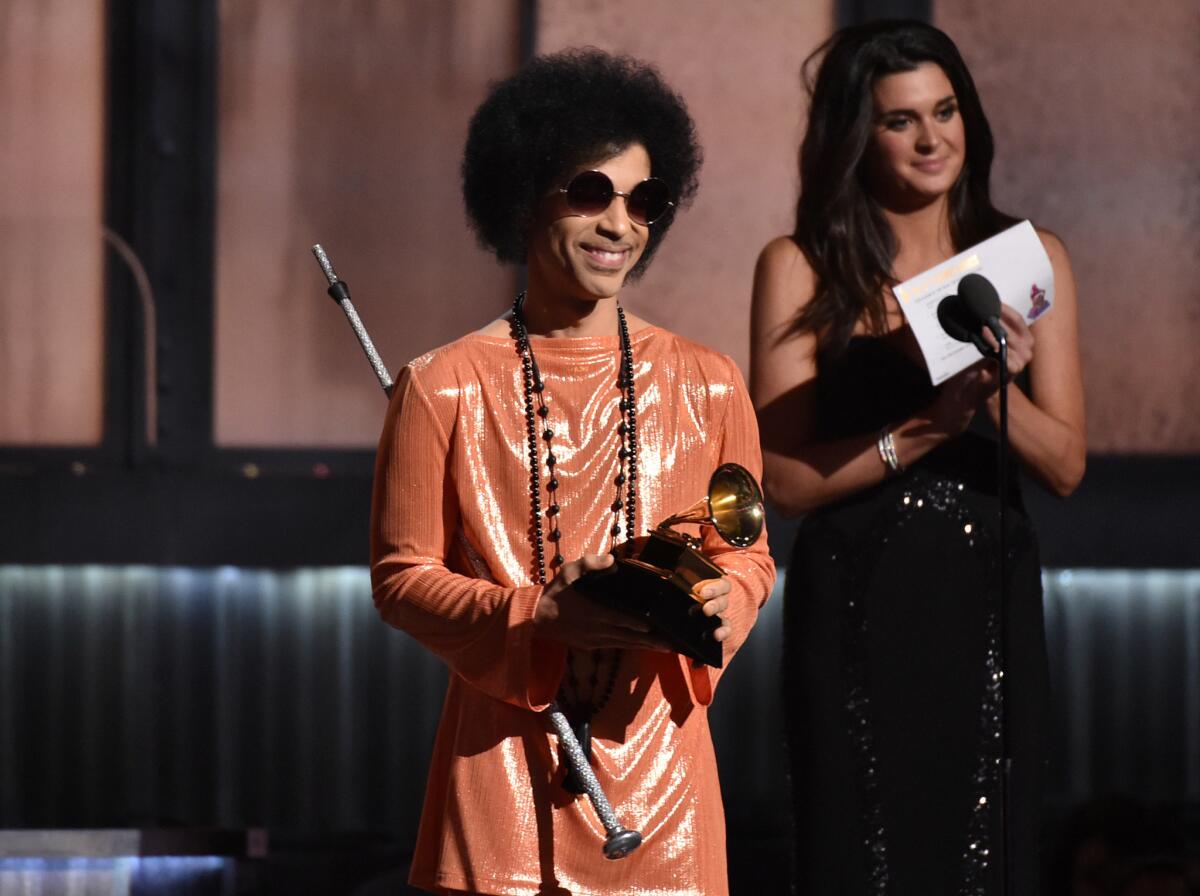The Grammy Awards at 60: What a long, strange trip it’s been
- Share via
Since the very first ceremony on May 4, 1959, the Grammy Awards have been unflaggingly in tune with innovations in popular music, consistently singling out the most visionary artists, groundbreaking recordings and influential cultural trends.
With apologies to Stephen Colbert: Just kidding.
Looking back at the recipients of the initial awards handed out during the presidency of Dwight D. Eisenhower, you’d never know the big bang called rock ’n’ roll had just exploded.
The first album-of-the-year Grammy went to film composer Henry Mancini, for “The Music From Peter Gunn.”
Despite the recent arrivals of Elvis Presley, Chuck Berry, Jerry Lee Lewis, Little Richard, Buddy Holly and other groundbreaking rock artists, the first record- and song-of-the-year honors went to the suave Italian singer-actor-guitarist Domenico Modugno’s hit recording of the lounge-music standard “Nel Blu Dipinto di Blu (Volare).”
Swing era icons Ella Fitzgerald, Frank Sinatra, Count Basie and Duke Ellington also took home Grammys that year. Had Twitter existed then, the Recording Academy would have been battling a #GrammysSoDad campaign.
That’s long made the academy a favorite target of musicians, music critics and cultural pundits. Yet many see progress in this year’s slate of nominations, arguing they better reflect what’s most relevant in pop music at the moment. This year’s ceremony is set for Sunday at Madison Square Garden in New York.
The ridicule is no mystery to those who’ve paid attention to Grammy results.
It has taken years, sometimes decades, for the Recording Academy to catch up with evolving genres that have altered the pop landscape — first rock, then punk, rap, grunge, electronic dance music and Americana.
“Historically, the Grammys have often been been laughably out of touch,” said veteran Rolling Stone writer and author Anthony DeCurtis, a Grammy winner for his liner notes for the 1988 Eric Clapton box set “Crossroads.”
“When I was nominated in 1988, my first response was, 'Does anyone really take these things seriously?' When I won, I discovered that, indeed, the industry takes the Grammys very seriously. For the next year or so, not one day passed without someone mentioning my Grammy to me.”
Yet for every savvy honor bestowed on Stevie Wonder, Bob Dylan, OutKast, Paul Simon or one or more members of the Beatles, academy voters have stubbed multiple toes with major-category statuettes given to the likes of lip-syncing duo Milli Vanilli, soft-rock singer Christopher Cross and disco group A Taste of Honey.

This year, the Grammys seem very much of the moment — and they deserve to be acknowledged for having come such a long way.
— Anthony DeCurtis, Grammy-winning author
The Grammys were painfully slow to recognize many of the most influential musicians of the era: Presley didn’t get a Grammy until 1967 — a full decade after he’d led the rock ’n’ roll uprising — and that was for a gospel recording.
Bob Dylan didn’t take home Grammy gold until 1973 — for his part in George Harrison’s multi-artist benefit album “The Concert for Bangla Desh” — and it was nearly another decade before Dylan won a Grammy for his own work: a rock vocal award for “Gotta Serve Somebody” — from his first gospel album.

Dylan wasn’t alone: During the ’60s, no Grammys went to Jimi Hendrix, the Rolling Stones, Otis Redding, Janis Joplin, Marvin Gaye, Van Morrison, the Byrds, the Doors or numerous other artists who altered the musical landscape.
“I'm pleased that the Grammys have tried to catch up with what's important, but when we were comin' up, it was Andy Williams’ time — nothing important or lasting going on,” said Doors drummer John Densmore, who, along with his bandmates, received the academy’s Lifetime Achievement Award in 2007. “We actually didn’t want one... it seemed too corny. Now, it seems more coveted.”

Count Hendrix in the same camp.
“The subject never came up,” said Janie Hendrix, the guitar hero’s sister and president/chief executive of Experience Hendrix LLC, which administers his estate. She also served five years on the board of governors for the academy’s Pacific Northwest chapter.
“I don’t know that it really mattered much to him — awards,” she said. “He wasn’t creating his music for that type of recognition. He just wanted people to hear his music. In those times, rock ’n’ roll artists weren’t recognized.”
In the ’70s, the Grammys ignored future Rock Hall of Fame members David Bowie, Prince, Patti Smith, Bruce Springsteen, Elton John, Curtis Mayfield, the Clash, Tom Petty, George Clinton, Tom Waits and Lou Reed — the latter will posthumously be honored Sunday when the Velvet Underground receives a Lifetime Achievement Award.
“While he never would have admitted it, the Lifetime Achievement Award going to the Velvet Underground this year would have been meaningful to him, and I'm sure he would have shown up to accept it, said DeCurtis, Reed’s biographer.
Key figures from the ’80s and ’90s such as Madonna, the Pretenders, N.W.A, Public Enemy, Nirvana and Tupac Shakur were initially, and in some cases still, missing in Grammy Award action.
“It’s clear that for a long time, many of those later deemed to be influential enough to warrant induction into the Rock and Roll Hall of Fame weren’t honored by the Grammys in their time,” said Rock Hall President Greg Harris. “But it’s refreshing this year to see nominations for hall inductees in different categories such as Bob Dylan, Leonard Cohen, Metallica, Gregg Allman, the Rolling Stones---and that they’re being honored for their output [last] year.”
The list of missed opportunities and outright blunders goes on, reflecting a growth process that can charitably be described as awkward — but not surprising, which makes the consistently forward-looking slate of nominees this year all the more remarkable in the context of Grammy history.

As much as any year on record, the 2018 nominations skew toward artists and recordings that are shaping and reshaping the pop music landscape, with the emphasis heavily on hip-hop, which has become the lingua franca in the music industry as well as the culture at large.
That’s evident in multiple nominations for hip-hop and R&B artists Jay-Z, Kendrick Lamar, Bruno Mars, Childish Gambino, Khalid, No. I.D. and SZA, a slate academy officials point to with considerable pride, given its long history for being out of touch.
Nominations include a Spanish-language record- and song-of-the-year contender in “Despacito,” the runaway hit single from Puerto Rican singer Luis Fonsi and rapper Daddy Yankee, which also features Canadian pop star Justin Bieber.
The Recording Academy, originally known as the National Assn. of Recording Arts and Sciences, was created in 1957 by veteran record executives from a small handful of major labels, with artistic input from Doris Day, then a major pop and film star, composer-conductor Paul Weston and arranger Axel Stordahl.
Major labels in the ’50s viewed rock ’n’ roll as a threat, ceding the music to scrappy independents and ignoring it institutionally as long as possible.
The academy’s founders had come of age during the big band and swing era, and the Grammys initially rewarded purveyors of the Great American Songbook trove of music largely created before and during World War II.
The Recording Academy has implemented various changes over the years to bring the awards themselves more into line with the organization’s stated mission to recognize music “that represents the highest level of excellence and continues to impact and reflect our culture,” as current academy President and Chief Executive Neil Portnow put it in announcing this year’s nominations.
Yet the Recordings Academy has frequently found itself on the defensive for its choices. One oft-cited example: the best new artist award for 1978 to A Taste of Honey, which quickly faded from view after its No. 1 hit “Boogie Oogie Oogie” ran its course.
Among the other nominees that year was upstart English singer-songwriter Elvis Costello, who went on to become one of pop’s most respected and prolific figures and whose career is still vibrant 40 years down the line.
Perhaps the ceremony’s most infamous gaffe was the new artist trophy given in 1990 to German pop duo Milli Vanilli, whose members later conceded that they’d not sung on any of the recordings that prompted the award.
But don’t expect to hear much criticism from those who still make a living in the recording industry. “It would be suicide if I told you what I really think” of the Grammys’ track record, said one veteran record label head, who asked not to be identified.
The disconnect between music that was driving change and that was most broadly entertaining the masses came to a head at the Grammys in the 1980s, with album of the year awards to works such as Cross’ “Christopher Cross” for 1980, Toto’s “Toto IV” (1982), Lionel Richie’s “Can’t Slow Down” (1984) and Phil Collins’ “No Jacket Required” (1985), ultimately resulting in the academy introducing blue-ribbon committees to vet nominees.
The stated goal — again — was to recognize artistic excellence over commercial success. One problem had been that certain record labels or label groups seemed over-represented year in and year out, something that was especially noticeable in some of the classical categories.
As the Recording Academy’s senior vice president of awards, Bill Freimuth, told Billboard recently: “The classical community said, ‘We need to come up with something that’s going to give some other folks a chance,’ and they were thrilled at the new results.”
The new methodology was soon extended to the four general categories: album, record, song and new artist.
Around the same time, however, an era that some have called the “career catch-up awards” began, with key wins to previously overlooked artists such as Clapton, Santana, Steely Dan, Ray Charles and Herbie Hancock, among others.
Arguably the most intensive campaign to bolster the Grammys’ relevance has come in the last few years.
“The Grammys have steadily made an effort to become more relevant, and this year, it has pretty much achieved that goal impressively,” DeCurtis said. “This year, the Grammys seem very much of the moment — and they deserve to be acknowledged for having come such a long way.”
Membership requirements have changed recently to ensure that voters are actively working in the music business, rather than continuing to vote years or decades after retiring. Now, recertification is required when memberships are up for renewal, something that used to happen automatically.
At the same time, the academy has encouraged younger musicians, producers, engineers and others to join and participate via online voting.
“I think there are probably a couple of elements that are directly responsible for what you’re seeing in this year’s nominations,” Portnow told The Times recently. “No. 1, we have continued, and will continue, to strive for a relevant voting membership.
“The second piece is that [this year’s nominations are] a true reflection of the culture and where music is today. Hip-hop and urban [music] are pervasive in the mainstream, not only in music but in culture, and not just in America but worldwide.”
‘The 60th Grammy Awards’
Where: CBS
When: 4:30 p.m. Sunday
Rating: TV-14 (may be unsuitable for children under the age of 14)
MORE GRAMMYS:
Follow @RandyLewis2 on Twitter.com
For Classic Rock coverage, join us on Facebook
The biggest entertainment stories
Get our big stories about Hollywood, film, television, music, arts, culture and more right in your inbox as soon as they publish.
You may occasionally receive promotional content from the Los Angeles Times.







